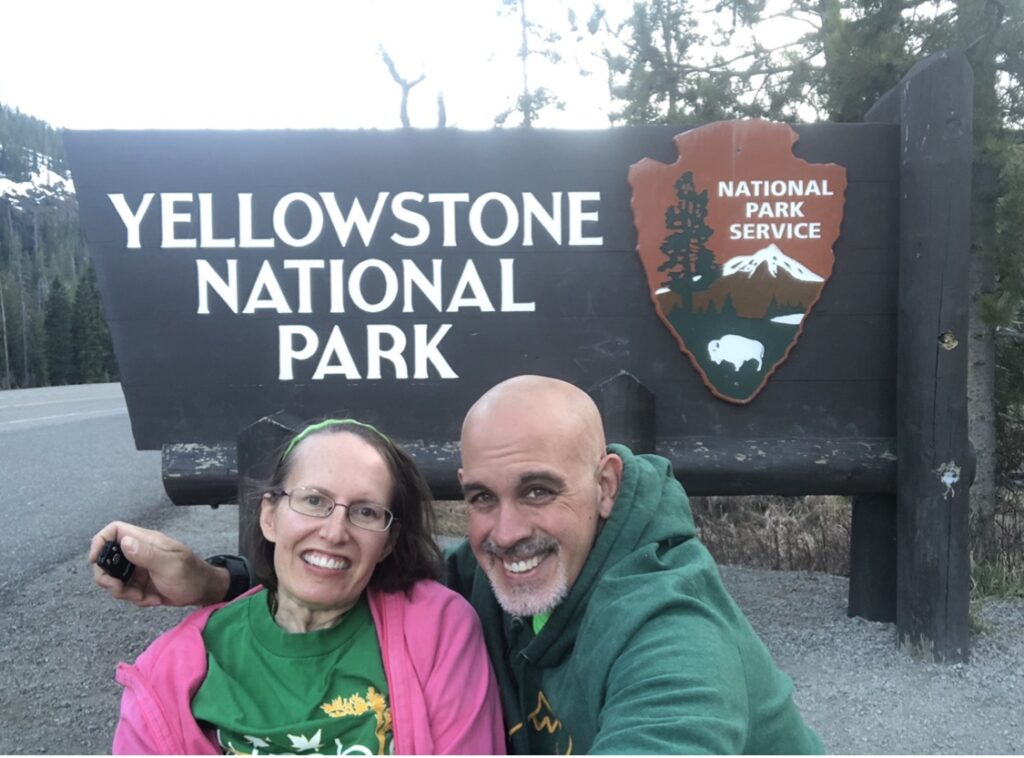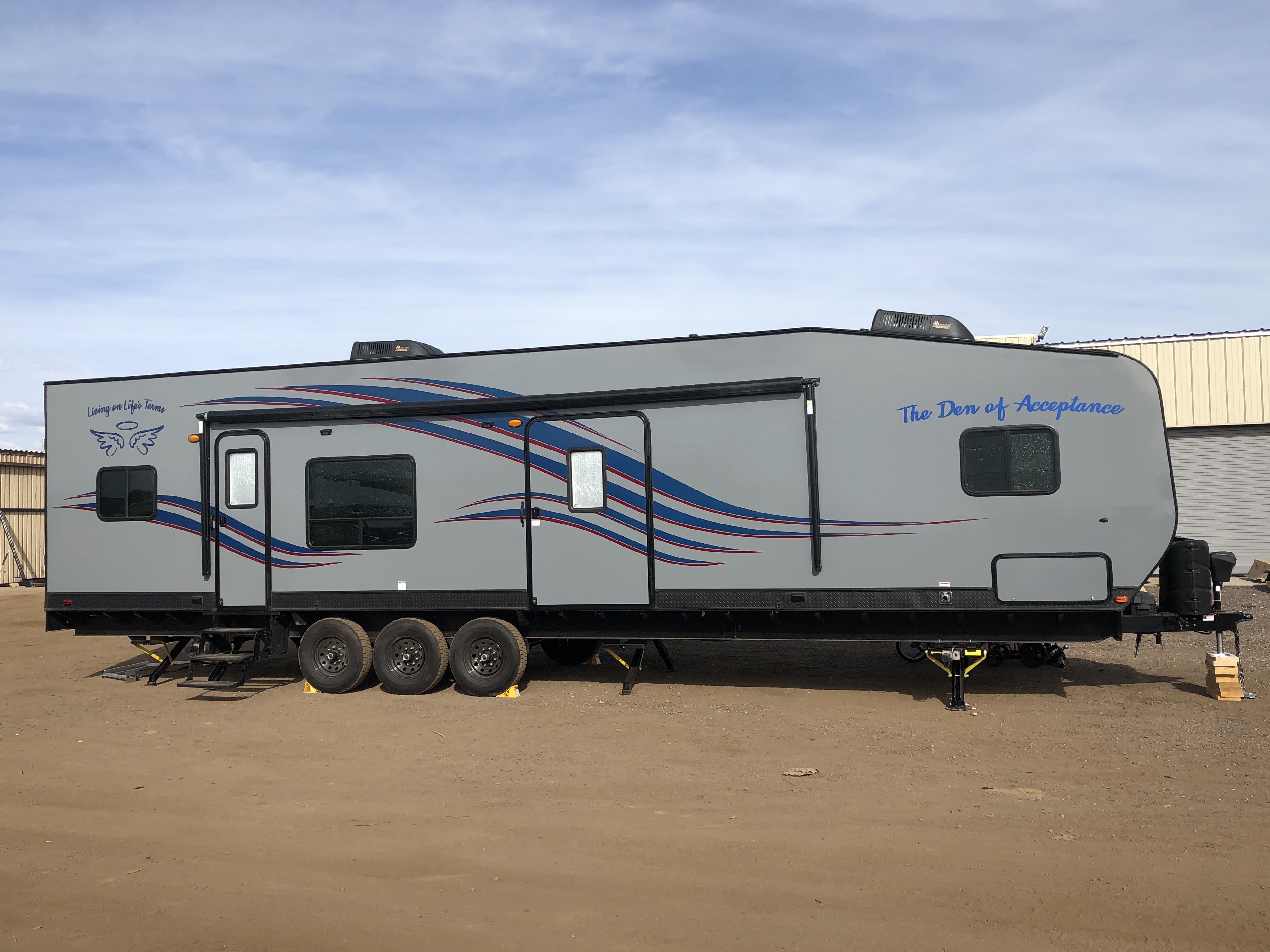
Full-time RVers with a Disability are Living on Life’s Terms
When Patrick Lang found a new life through sobriety, he had no idea that the road ahead would include full-time RVing while caregiving for his wife, Colleen. Today, the Wisconsin couple is currently roaming across North America. Wherever they roll, this dynamic duo is showing people it’s possible to enjoy nomadic travel while managing a life-altering medical condition.
A diagnosis like Spinocerebellar Ataxia (SCA) would stop many people in their tracks. But the Langs aren’t like other people. Instead, they decided to explore the country for as long as they could with their two dogs.
“It just felt like the right thing to do,” recalls Patrick. While the progressive, degenerative, and often fatal genetic disease slowly robbed Colleen of her ability to speak or walk, they went full-speed ahead and made plans for full-time RVing.
“Although Colleen was getting the help she needed, something was missing,” Patrick writes in their blog, Living on Life’s Terms. “In August of 2018, we decided to make the biggest decision of our lives. We decided to sell our house and almost everything we owned so we could travel.”
Their last camping trip was fifteen years prior, but a lack of RV experience didn’t stop them. “We knew we had a limited amount of time to do what we’re doing. We do it now or we don’t do it,” Patrick said.
How they Found a Wheelchair Friendly, Accessible RV
He reached out to Dune Sport in Arizona, an RV manufacturer building custom toy haulers. Then he worked with the company to create an affordable, wheelchair-friendly RV that would accommodate Colleen’s mobility challenges, yet feel like home. For the finale, Dune Sport painted custom graphics that depict the couple’s philosophy of life.

Dune Sport made their adaptive toy hauler. Image: Patrick Lang
“If there is one word that encompasses what we strive for each day, ‘Acceptance’ would be that word,” writes Patrick. “Accepting our life situation does not mean we are resigned to it. It is very easy to look at our challenges and think here are our limitations and resign to a life of just existing each day. We do not believe that is God’s design for us. We believe he wants each and every one of us to be happy and to live a fulfilled life. By practicing acceptance, we acknowledge these challenges and work to adapt to them. We do not believe these challenges are happening to us, but rather they are happening for us.”
Neither one knew anything about RVing before their open-ended road trip began. The dual challenge of learning the ropes of RVing and adaptive travel wasn’t easy, but Colleen’s laid-back attitude and infinite patience keeps the Langs on track. “It’s incredible in how she processes life,” says Patrick. “When I start getting wrapped up in whatever it is, she’ll let me know, ‘Relax, it’ll be OK.’”
Learning important skills for adaptive RV travel
Predicting when adventure morphs into mishap is impossible, but the uncertainty of moving from place to place is worth it if full-timing is something you want to do. “RVing will be the best and most challenging time I’ve of your life,” writes Colleen. “Stick it out. Things get better,” she advises.
RVing while caregiving through 30 states and counting has taught the couple critical survival skills like how to balance driving days with resting days. “During our trial and error learning curve, we have developed what has worked for us,” says Patrick. “In our case, I have to help Colleen with many acts of daily living. When we are stationary it isn’t too bad, but when we are on the move it is a bit more challenging.”
Travel days can be exhausting, but they’re up to the challenge by sticking to a strict schedule. The day before moving, they prep the RV for travel. The next day, they’re ready to go with minimal effort. They won’t travel more than 200 to 250 miles from one destination to another. This eliminates the need for fuel stops on the way.
They also stop for a bathroom break about sixty to ninety minutes before reaching their destination. “This usually ensures that Colleen and the dogs are comfortable during set-up at our new location.” Once they’ve arrived, they dedicate the next day to resting. “Because of the energy required for us, we typically do not stay anywhere for less than 4 nights,” he explains.
Life doesn’t have to keep you in place
Some days are easy, some aren’t, but all prove to the Langs that full-time RVing while caregiving was the best decision they’ve ever made. “There’s a lot of resources and things you can do to get out and enjoy yourself, to not let something like this to permanently keep you down,” says Patrick.
“When it’s all said and done, the days that I go to sleep, it still amazes me,” he adds. Colleen is equally enthusiastic about their choice to hit the road, and adds, “If you get the opportunity to RV, say yes.”
Resources for full-time RVing while caregiving
Patrick’s number one tip to find wheelchair-friendly campgrounds is to ask questions when you go into a park. “Some are set up for people that are wheelchair-bound,” he says. “Describe your limitations and capabilities, describe what your RV needs are, ask if they have a site that fits your needs.”
The Langs find wheelchair-friendly destinations through adaptive travel Internet support groups and websites. By reaching out to others who travel, they can pinpoint campgrounds and attractions that work for their needs. If you are part of a couple who is RVing with adaptive mobility needs, Patrick and Colleen suggest the following resources:
- AccessibleNature.com, a collection of links to places you can go to enjoy nature with minimal obstacles.
- AllTrails.com, trail guides and maps for camping and hiking, has a filter that allows you to search for wheelchair-friendly locations.
- The Camping With Disabilities or Chronic Illness Facebook Group
- RV LIFE Campgrounds makes it easy to find campgrounds, their contact information, and reviews from other travelers.
Also check out these articles:
- Winnebago Reveals New Wheelchair Friendly Motorhomes
- Push Yourself In The GRIT Freedom Chair All-Terrain Wheelchair
- This Colorado Park Offers Track Chairs For Those With Mobility Issues
- Resources For RVers With Mobility Challenges

Would love to know how you manage meds and Drs on the road.
Sandy, hopefully Patrick & Colleen will see your question. For now, it’s my understanding that they have selected Yuma as a home base for physicians, and so far haven’t needed to utilize any medical care for Colleen while traveling.
Sandy – one word…Walmart. While full-timing, I was being treated for severe asthma and COPD so when flair ups came, as they always did during the 9 months of pollen season, we would order and pick up meds at the local Walmart. I also carried several medications for infections with me. My doctor would give me a starting dose of antibiotics to take until I found a doctor in the area we were staying. It’s true, you can do anything you set your mind too if you want it badly enough. Good luck and happy rolling!